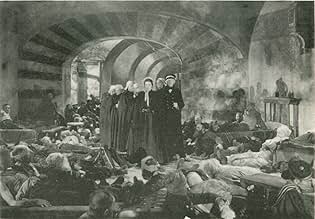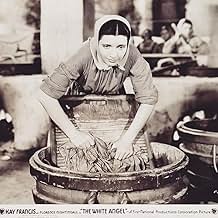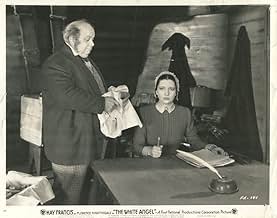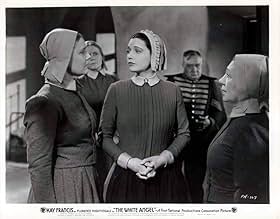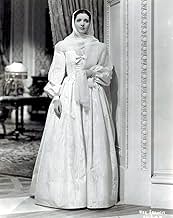अपनी भाषा में प्लॉट जोड़ेंA look at the life of Florence Nightingale.A look at the life of Florence Nightingale.A look at the life of Florence Nightingale.
- पुरस्कार
- 2 जीत और कुल 1 नामांकन
Lillian Kemble-Cooper
- Parthenope 'Parthe' Nightingale
- (as Lillian Cooper)
फ़ीचर्ड समीक्षाएं
Kay Francis was cast as Florence Nightingale and the film shows Florence from the time just before she dedicated her life to nursing to just after her return from the Crimean War. Francis' acting and that of most of the supporting actors was good--the dialog and details left a bit to be desired.
Hollywood sure loved bio-pics in the 30s and 40s and churned out gobs of them. The problem, though, is that while many were very entertaining, they also played rather fast and loose with the facts as well as had very, very high "schmaltz" levels on many occasions. In other words, the celebrities being portrayed were very often over-idealized and seemed more like living saints than 3-dimensional heroes. While Florence Nightingale was an absolutely amazing woman and deserved to have a film made about her, all too often the film degenerated into idol worship. My favorite over-the-top moment was when Flo entered the dilapidated hospital and the man ran screaming "water!!!"--what an amazingly unsubtle moment! While the general facts in the film are correct, the way they were realized on screen, at times, made me laugh. This is really a shame, as the real story of this woman should be good enough! As for me, I'd like to see a more realistic and less predictable treatment of her long life.
Hollywood sure loved bio-pics in the 30s and 40s and churned out gobs of them. The problem, though, is that while many were very entertaining, they also played rather fast and loose with the facts as well as had very, very high "schmaltz" levels on many occasions. In other words, the celebrities being portrayed were very often over-idealized and seemed more like living saints than 3-dimensional heroes. While Florence Nightingale was an absolutely amazing woman and deserved to have a film made about her, all too often the film degenerated into idol worship. My favorite over-the-top moment was when Flo entered the dilapidated hospital and the man ran screaming "water!!!"--what an amazingly unsubtle moment! While the general facts in the film are correct, the way they were realized on screen, at times, made me laugh. This is really a shame, as the real story of this woman should be good enough! As for me, I'd like to see a more realistic and less predictable treatment of her long life.
The White Angel which was a film about the crucial years in the life of Florence
Nightingale when she during the Crimean War popularized the career of nursing
for women and sanitary hospitals. Her work in Great Britain and Clara Barton in
the USA during the Civil War set the standards for the nursing profession as we
know it now.
Nightingale came from an upper class background and that probably stood her in good stead because someone who had to worry about how the next month's rent was to be paid or the next meal coming from could not have taken on what she did or faced down the sexist attitudes of her age.
The British cinema did the best version of her life in 1951 with Anna Neagle playing Nightingale. Besides Florence herself the real name of only one other character is used, that of Lord Raglan the Commander of the British forces in the Crimea played here by Halliwell Hobbes. The real players are used in the Neagle film.
This was a change of pace for Kay Francis who usually was more glamorous in her roles than here. Francis reminds me a lot of Rosaland Russell when she did Sister Kenny.
This was part of Warner Brothers biographical films of the late 30s and The White Angel was the only one to have a female subject. The White Angel bogs down a bit in spots and for a more accurate film the Neagle picture is better. Still this is reasonably entertaining and Kay Francis fans will like it.
Nightingale came from an upper class background and that probably stood her in good stead because someone who had to worry about how the next month's rent was to be paid or the next meal coming from could not have taken on what she did or faced down the sexist attitudes of her age.
The British cinema did the best version of her life in 1951 with Anna Neagle playing Nightingale. Besides Florence herself the real name of only one other character is used, that of Lord Raglan the Commander of the British forces in the Crimea played here by Halliwell Hobbes. The real players are used in the Neagle film.
This was a change of pace for Kay Francis who usually was more glamorous in her roles than here. Francis reminds me a lot of Rosaland Russell when she did Sister Kenny.
This was part of Warner Brothers biographical films of the late 30s and The White Angel was the only one to have a female subject. The White Angel bogs down a bit in spots and for a more accurate film the Neagle picture is better. Still this is reasonably entertaining and Kay Francis fans will like it.
The sharp, focused performance by Kay Francis carries this film into an impressive arena for its viewer. I've seen in several times and although Francis doesn't go into histrionics in her portrayal like some of the "greats" would -- Francis exemplifies the determination, courage, and humaness of one who "feels a calling". She never wavers in what she is about, frustrated but not discouraged, and Francis' subtlety emphasises these qualities. The beginning of the film offers Francis a chance to don the elegant gowns of the mid 1800's, but most of the film she's wearing a plain nurse's uniform and often looking quite drawn from the conflicts with male prejudice on the Crimean front and the squalid conditions that she faced in all directions. I don't know how historically accurate the film is, but it gets to the heart of the Nightingale story and what she was up against. Strong support from players like Donald Crisp and Ian Hunter add to the overall success.
With a title like The White Angel, you kind of know what you're going to get, if you'll excuse the pun, a whitewash. Of course a person like Florence Nightingale should be celebrated for her achievements but this film presents her as a saint rather than a living, breathing and flawed human being. Again, no joke intended but the characters for her are depicted as heroic and those against her, villainous, so, rather black and white. A more serious biopic might have been entitled The Lady With the Lamp and indeed a passage of the film where various characters read out Longfellow's poem of the same name is one of the most effective and moving scenes of the film. German director, William Dieterle, known for many great movies such as the beloved 1939 version of The Hunchback of Notre Dame and more significantly, for me, 1941's masterpiece, The Devil and Daniel Webster, is a sure hand on the tiller and moves things along with pace and interest but is fighting a battle with the script. The best you can say of it, is it is of it's time. The worst affected is the star, Kay Francis, a fine actress who delivers with conviction but is encumbered with po faced and twee lines that beggar belief. Her talent is evident in that she still manages to make her role engaging. Fortunately, she also has a sterling cast to play alongside her; on the 'good' side the redoutable Halliwell Hobbes brings charisma in spades as Lord Raglan and Ferdinand Munier is enjoyably whimsical as the camp cook, Soyer. On the distaff side, Donald Crisp is effectively cold as Dr Hunt, Montagu Love, suitably oily as Bullock and Nigel Bruce, my reason for watching, is hugely pleasurable to watch as the pompous and condescending Dr West, and unlike the other two antagonists, manages to be likeable into the bargain. All three represent the crushing patriarchy that our heroine needs to overcome both in England and the Crimea. Striking a false note is Billy Mauch as drummer boy, Billy, so very American and so very twee that his appearances jar and take you out of the story. Talking of twee, the appearance of Queen Victoria's arm and her arm only, takes the biscuit! But to conclude at an hour and a half with first rate acting and direction this is a good biopic and with a stronger script could have been a excellent one.
It's very melodramatic, reminding me of Young Tom Edison. Every "tidbit" the average person knows about the famous person is included in the script, in the most saccharine-style possible. Months after she sits up all night with Billy Mauch when he's ill, he finds her sitting in the snow. "I'm taking care of you now," he says as he gives her his coat. There are countless scenes like that one, as costars who play coworkers of Florence Nightingale praise her selflessness and dedication to her patients. In another scene, she comes down with cholera, and rather than letting the medical staff carry her away on a stretcher, the soldiers in the trench insist on doing it. That's fine, but one soldier actually says, "We'll do it! Who cares about cholera?" Way too corny for my taste.
But, if that's why you're watching the movie, you might not mind the style. I minded, because I was hoping for a more historical approach as to why she became a nurse, rather than just scene after scene of her forgoing sleep in order to sit up with a sick patient. There's a little portion of the beginning that shows her decline a marriage proposal in favor of medical school, but it's not very explanatory. There is a large supporting cast, though, including Henry O'Neill, Ian Hunter, Halliwell Hobbes, Nigel Bruce, Donald Crisp, Donald Woods, Fay Holden, and E. E. Clive. Watch at your own risk, and only if you like dated biopics.
But, if that's why you're watching the movie, you might not mind the style. I minded, because I was hoping for a more historical approach as to why she became a nurse, rather than just scene after scene of her forgoing sleep in order to sit up with a sick patient. There's a little portion of the beginning that shows her decline a marriage proposal in favor of medical school, but it's not very explanatory. There is a large supporting cast, though, including Henry O'Neill, Ian Hunter, Halliwell Hobbes, Nigel Bruce, Donald Crisp, Donald Woods, Fay Holden, and E. E. Clive. Watch at your own risk, and only if you like dated biopics.
क्या आपको पता है
- ट्रिवियाMuch disagreement to the origin of the source material exists. Some contemporary sources believed the source was Lytton Strachey's 1918 biographical essay in "Eminent Victorians". Others contend Michael Jacoby was the author. Warner Bros. executive Hal B. Wallis contended that the life of Florence Nightingale was in the public domain, and that screenwriter Mordaunt Shairp did his own research. The MPAA agreed with Wallis; no source credit was necessary.
- गूफ़When Florence is receiving the news on the steps of the hospital of the sinking of the French transport, the shadow of the boom microphone moves onto then quickly off her left sleeve.
- क्रेज़ी क्रेडिटPrologue: Towards the year 1850, England was at peace with the world. Her men were following her ships to the four corners of the earth, building the great empire that is Queen Victoria's monument. Women were only permitted to nod meek approval. In all England, only Her Majesty had the right to express herself with the independence of a man.
- कनेक्शनFeatured in Breakdowns of 1936 (1936)
- साउंडट्रैकAuld Lang Syne
(uncredited)
Traditional
Lyrics by Robert Burns
Incorporated into the score at the new year
Sung by the crowd celebrating the new year
टॉप पसंद
रेटिंग देने के लिए साइन-इन करें और वैयक्तिकृत सुझावों के लिए वॉचलिस्ट करें
विवरण
- रिलीज़ की तारीख़
- कंट्री ऑफ़ ओरिजिन
- भाषा
- इस रूप में भी जाना जाता है
- Beli Andjeo
- फ़िल्माने की जगहें
- उत्पादन कंपनियां
- IMDbPro पर और कंपनी क्रेडिट देखें
- चलने की अवधि
- 1 घं 32 मि(92 min)
- रंग
- ध्वनि मिश्रण
- पक्ष अनुपात
- 1.37 : 1
इस पेज में योगदान दें
किसी बदलाव का सुझाव दें या अनुपलब्ध कॉन्टेंट जोड़ें



